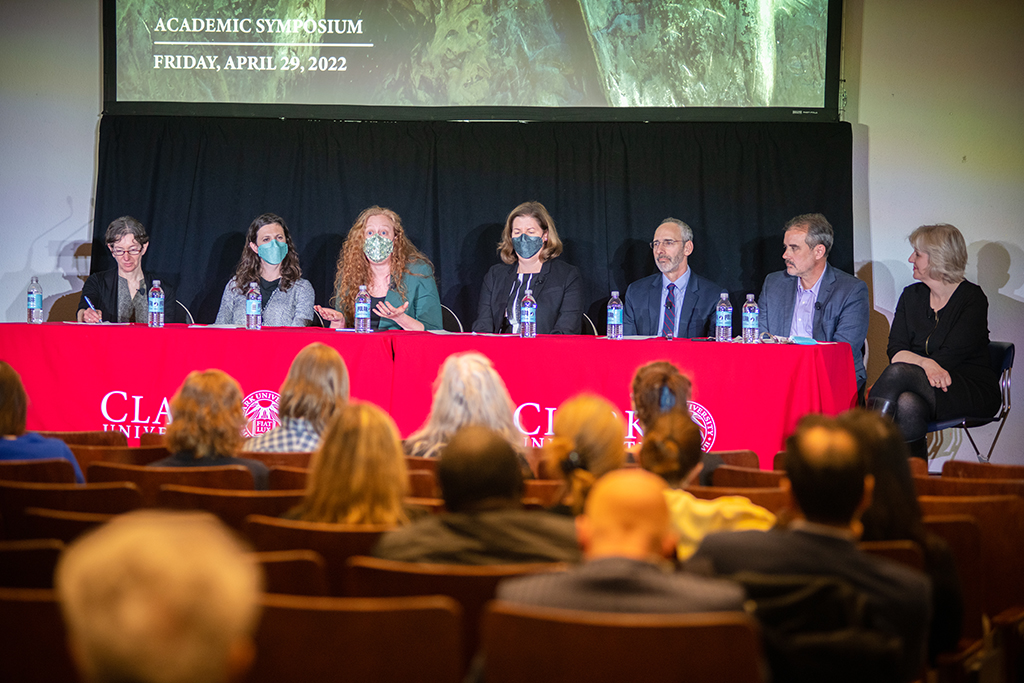INAUGURATION ACADEMIC SYMPOSIUM – APRIL 29, 2022
The fraying of democracy is a global problem, professors say

Clark professors of political science came together Friday to address the crisis in democracy unfolding in Russia, China, the Middle East, Latin America, and the United States.
Part of the Academic Symposium, one of the events held to celebrate the Inauguration of President David B. Fithian, the April 29 session, “Democracy in Distress?,” was moderated by Kristen Williams.
Valerie Sperling used the democratic deterioration in Russia as a lens with which to view threats to democracy in the U.S.
“One unfortunate commonality between the United States and Russia is the rise of censorship on certain subjects, and the spread of disinformation,” she said. “There are many people in both Russia and the United States living in a whole parallel universe of disinformation. And although one set of lies results from the absence of free speech, and the other arises in an atmosphere of free speech, the outcome is incredibly destructive to democracy.”
“Studying China, I don’t have much to say about democracy,” noted Suzanne Scoggins. “Oftentimes China will talk about democracy, yet their version of democracy is not what our definition of democracy is.” Scoggins said the single-party state poses a threat to other nations who are invested in a deepening of democracy.
Ora Szekely, whose focus is on the Middle East, said a decade ago the Arab Spring offered a glimmer of hope that the region was getting a much-delayed democratic transition. Today, she noted, “things are back to looking fairly bleak” and are sliding back into autocracy.
Szekely said the notion that the Arab world does not want democracy “is entirely untrue,” citing instances where Iraqis have risked their lives to venture to polling locations to participate in elections, and point to the 70 percent voter turnout rates in Libya in 2012.
Heather Silber Mohamed cited an NPR poll that revealed the majority of Americans believe U.S. democracy is in peril.
“Many people think polarization is worse now than ever before. We tend to point to the ’50s as this golden era of collaboration and cooperation, but it was also a very non-democratic period in the U.S.,” she said, noting that communities of color and women were largely excluded from politics.
“Despite everything that’s happening, young people today are politically engaged at extremely high rates” and care deeply about issues such as climate change, polarization, and racial unrest. “The one area where I see hope is with our students and their generation,” she said.
An expert on Latin American politics, Paul Posner spoke about the rise of, and reasons for, populism, which he defined as “an ideology in which a leader attacks a corrupt elite on behalf of the people.”
Populists thrive on polarization, he said, and their goal is not the interest of the group they have captured as their base, but rather to maintain power. Such leaders don’t actually shut down the democratic system, they manipulate it to their advantage.
Posner said the failure of democratic regimes to be responsive to their constituents, combined with social and economic inequality, breeds populism.
“The inequality and the loss of status of certain groups of society creates a kind of desperation where they look for a strong leader to restore their lost status,” he said. “We see that in [Donald] Trump and in [Hugo] Chavez, in [Jair] Bolsonaro … we see that all across the globe.”
Posner said that by promoting solidarity and cohesion rather than cleavage and polarization we can overcome populism and the threat to democracy that it represents.
“You have to bring marginalized groups together,” he said.
Professor Michael Butler spoke about the broader threat fraying democracy presents to the global order.
“Whatever the problems of liberal democracy domestically and internationally, reverting to a Hobbesian war of ‘all versus all’ is not a better form of order. So we have a lot of work to do in terms of revising, revitalizing, and replacing some of the international and domestic institutions that aren’t really up to the task of the 21st century,” Butler said.
The panel also discussed whether freedom of speech is a symptom or cause of democracy in distress.
Silber Mohamed said social media was “driving some of the trends in polarization” and that although it could be a promising and powerful tool, it can also disrupt trust and a public understanding of truth.
The pressure put on our educational systems has left people “ill-equipped to discern what ideas are plausible and what truth is,” Butler added.
Szekely said topics addressed during the panel point to the value of a liberal arts education and “the ability to debate freely about complicated and difficult ideas.”
Read about the other sessions held for the Academic Symposium, one of the events celebrating the Inauguration of President David B. Fithian:
- Climate change work must extend beyond research
- Faculty put advanced digital technology to use in the classroom and lab
- Symposium session addresses Clark’s impact in the community
- The fraying of democracy is a global problem, professors say
- ‘The truth is what we see on the ground’
- Faculty researched, and learned from, the pandemic
- Life, and death, considered through the lens
- Academic Symposium inspires discussion on consequential concerns


